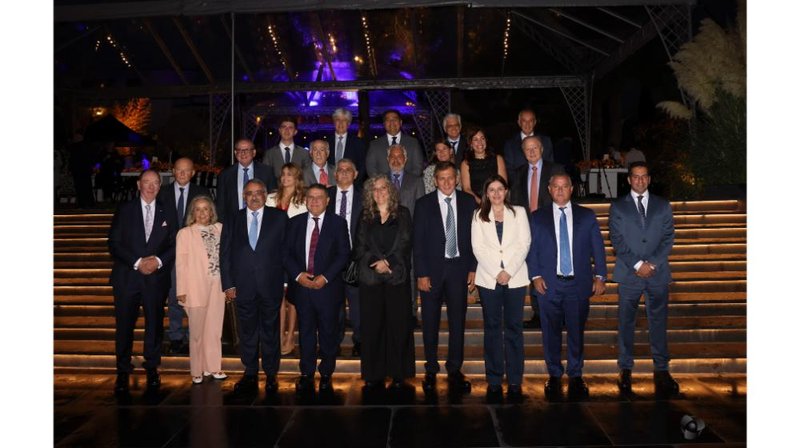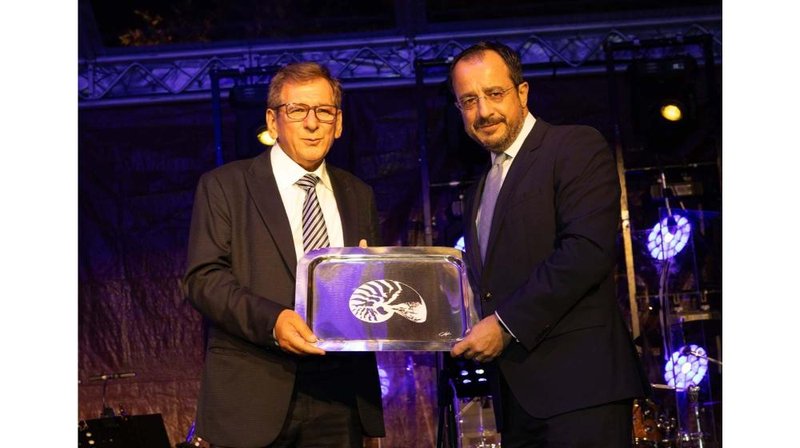Christodoulides and Hadjiyiannis underline the importance of the shipping sector (pics)
10:05 - 23 September 2024

Addressing a dinner hosted by the Cyprus Union of Shipowners in Athens, both President Nikos Christodoulides and the Union’s President Andreas Hadjiyiannis underlined the importance of the shipping sector.

Christodoulides noted the significance that Greece and Cyprus attach to the shipping sector was reflected in their joint decision that the shipping portfolio of the EU should be in "Greek hands." In this context, he expressed his pleasure concerning the nomination of Apostolos Tzitzikostas from Greece and of Costas Kadis from Cyprus, for the next College of Commissioners.
"Shipping horizontally touches all policy areas. As the European Union we must, first and foremost, approach it through our objective to play a geopolitical role. We cannot have any geopolitical role without Europe being a leading player in shipping," President Christodoulides underlined.
At the same time, he noted that he is an ardent supporter of close cooperation between the public and private sectors to enhance competitiveness and sustainable economic growth. This cooperation between Cyprus’ public and private shipping sectors is "the most successful model we have in Cyprus," he said.
Christodoulides also thanked Cyprus Union of Shipowners for its practical and substantial participation in the initiative of the humanitarian corridor, with a donation of foodstuff worth €300,000.

He also referred to the state’s duty to invest in education and training of human resources and to the supervision of the Deputy Ministry of Shipping to private marine academies.
Finally, Christodoulides underlined the close cooperation between Cyprus and Greece in the maritime sector, saying that it is an important pillar of development for both countries. "This cooperation has now been institutionalised at all levels within the framework of the High Cooperation Council," he concluded.
On his part, Cyprus Union of Shipowners President Andreas Hadjiyiannis noted that “today global balances depend on three main forces, nuclear weapons, social media and shipping.”
He continued, “In shipping in particular we are not living in an age of change. We are living through a change of times. The world that emerges will be radically different and uncharted.”
As Hadjiyiannis went on to the note, After World War II, shipping established itself as a driver of global growth through "near-perfect competition." An ideal theory that rarely finds application in real life.
He said that competition has led to “the minimisation of transport costs, eliminating distances, bringing countries and cultures together” and changing the destiny of humankind, underlining the role of the Greek people in this achievement.

Hadjiyiannis pointed out that shipping had been a forerunner of globalisation, “But we are not looking for praise for the Greeks - that, after all, is the work of historians. We care about the future. The biggest challenge is maintaining the present pluralistic nature of shipping against the risk of its monopolization.”
Hadjiyiannis also talked about China had transformed from an agricultural economy into an industrial superpower, “Through central state planning and unlimited state financial support for shipping, it invested in colossal shipbuilding facilities, surpassing traditional shipyards. Within two decades, it produces high-quality ships and already controls the larger share of the global shipping market.”
“Europe now faces the danger of a Chinese monopoly in shipping,” Hadjiyiannis warned, “A world completely dependent on it, Europe is losing ground without putting up a fight.”
“What was once thought possible is now a reality. China now owns the key to controlling the production of new ships. If this trend is not reversed in depth time, it will even be allowed to limit the construction of ships for them its competitors and gain control of the global supply chain,” he cautioned.
Hadjiyiannis also talked about European shipping’s emphasis on the development of green technologies.
“Undoubtedly the European environmental regulations are considered vital for the elimination of 2.5% of shipping emissions. But the high cost of implementation and the suffocating deadlines are putting existential pressure on European shipping,” he warned, adding that, “These, combined with the rapid Chinese rise, threaten to destroy his model free competition. Shipping, as established by the Greeks after World War II, is in danger of collapsing in its first century.
“China has already amassed undisputed power in shipping. The E.U. must recognise the magnitude of the threat and properly prioritize it,” Hadjiyiannis suggested, adding, “Defending the competition model is not a battle for the past but for the future.”
He underlined the role Greek Prime Minister Kyriacos Mitsotakis and President Christodoulides should play in this.
He also referred to the ongoing efforts to find a solution to the Cyprus Problem, noting, “The solution of the Cyprus problem, which will reunite the Cypriots, is liberating for the Turkish Cypriots as well.”

Hadjiyiannis talked about the shipping sector’s role in solidarity efforts including the Amalthea Initiative to get humanitarian aid to Palestinians, under the auspices of President Nikos Christodoulides, and Cyprus’ Independent Social Support Body, under the auspices of First Lady Philippa Karsera Christodoulides which provided scholarships for 1,000 students.

He thanked Thanasis Martinos, Polys Haji-Ioannou, Sir Stelios Haji-Ioannou, Ioanna Procopiou, Nicole Mylona and Gikas Goumas, and others, who had contributed to these efforts.
Hadjiyiannis also referred to the loss of Charalambos Mylonas, the founder of Transmed Shipping, and a former President of the Union.
He described Mylonas as, “A pioneer of Cypriot shipping, an unpretentious patriot and a benefactor.” “He was an enlightened mind, a teacher who opened horizons,” Hadjiyiannis continued, asking those attending to observe a minute’s silence in Mylonas’ memory.

